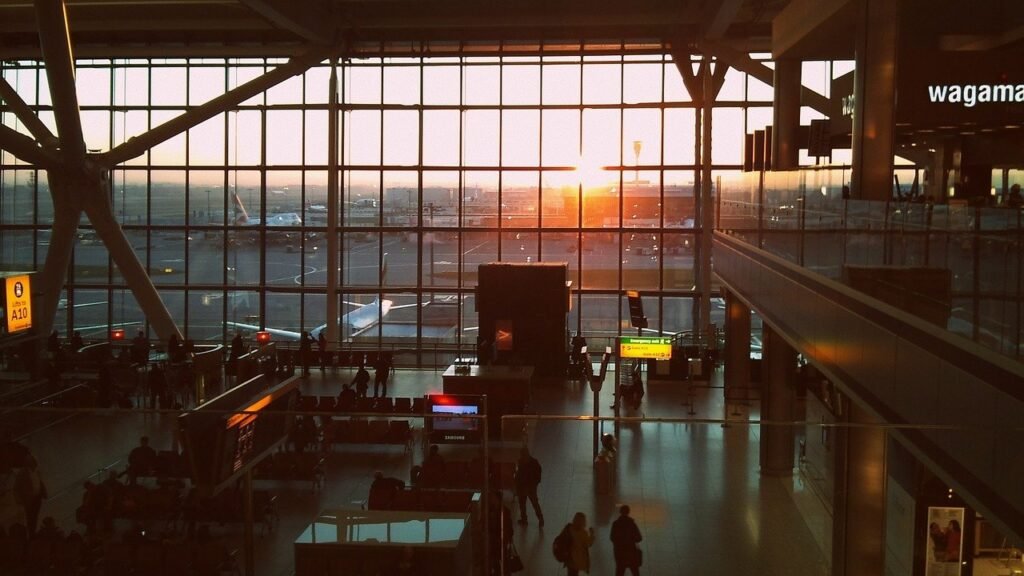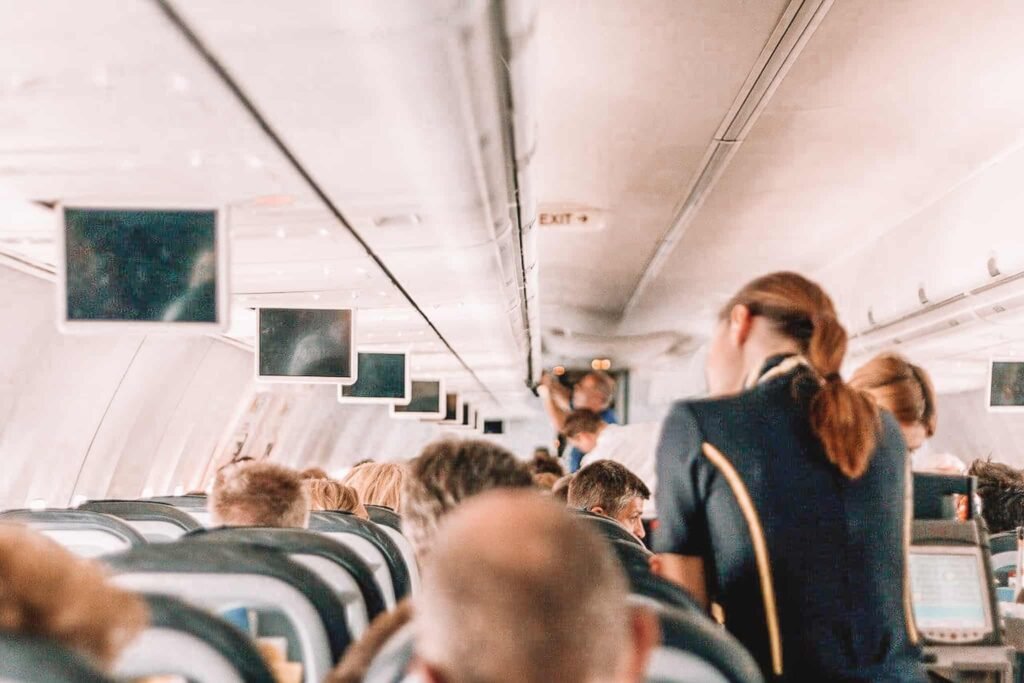So, you’re wondering how to become a flight attendant with no experience? I remember being in your shoes, dreaming of flying around the world but having no clue where to start. I wasn’t sure if it was even possible without any experience.
But here’s the good news: it absolutely is.
I had the same questions you probably do—how do you land a job as a flight attendant without any background in the industry? At 19, I dove headfirst into the journey, even though I didn’t know much about it.
And now, I’m here to help you do the same.
Whether you’re eager to travel, looking for a fresh career change, or finally pursuing a lifelong dream, I totally get it. No matter your reason, I’ll walk you through everything you need to know to become a flight attendant—experience or not.
Keep reading, and I’ll break it all down step by step!
How Do you Become a Flight Attendant With no Experience?
1. Check That You Meet the Minimum Requirements
First, let’s get this boring part out of the way.
Even though every airline is different and will have unique requirements, you must meet some general flight attendant requirements to become one.
Sadly, if you don’t meet these criteria you cannot be considered and you need to tick off the following boxes:
- Be at least 18 years old
- Be able to read, write, and understand English
- Have a high school diploma, GED, or equivalent
- Be tall enough to reach the overhead compartments. This is usually ranging between 152cm-190cm
- Meet the weight requirement of the airline. Here you are fine as long as you can fit in the jump seat and move around the airline
- Have good vision and hearing and can pass the test
- Have good health and pass the physical exam
- Not have visible tattoos or piercings when wearing a uniform
- Be able to pass a criminal background check and drug test
- You must be eligible to obtain required visas (for international flights)
- Be eligible to work in The United States (if applying for American companies)
- Be strong enough to maneuver meal carts, emergency exits, and windows (up to about 60kg)
Now, remember that all airlines are different and you have to read up on the requirements and job description with the specific company.
Finally, I just want to add that anyone can become a flight attendant and the industry is not as conservative as it once was. Most airlines now pride themselves in hiring many different types of people and promote being anti-racist, anti-sexist, non-discriminatory, etc.
If you are a professional, friendly, and capable human being, you can land a flight attendant job.
2. Write a Killer Application and Resume
The competition for a flight attendant position is tough, so you need to make sure your application stands out. Your resume should be tailored to each airline, well-written, and professional. Add a personal touch—include a photo of yourself, share a bit of your story, and avoid sounding robotic.
Airlines want to know why you want to work for them specifically. Show them you’ve done your homework and express your genuine interest in their airline.
If you’re not sure where to start, here are some key qualities most airlines look for that you can highlight, even without direct experience:
Service Experience
Flight attendants provide more than just safety—they’re also there to give passengers a great service experience.
If you have any customer service experience, even in a small way, make sure to highlight that.
Sales Skills
Airlines often expect their staff to sell products, whether from the trolley or duty-free. If you have any sales experience, showcase it! It’s a valuable asset.
Team Player
Working in the air means being part of a team. Airlines want people who know how to collaborate with others. If you’ve ever worked in a team environment or had leadership responsibilities (like being a team captain), mention it.
Love for Travel
Loving travel is essential for thriving as a flight attendant. If you’ve traveled, weave that into your resume. You don’t have to list every destination—focus on how it’s shaped you. For example:
“Last year, I traveled around Europe, which helped me grow as I experienced new cultures.”
If you haven’t traveled much, express your excitement for it:
“Traveling has always been my biggest dream, and I look forward to seeing more of the world.”
Language Skills
Speaking multiple languages is a bonus. Even if you’re not fluent, include any additional languages you know.
Flexibility
The flight attendant lifestyle isn’t your typical 9 to 5. Airlines look for people who thrive in a flexible work environment.
If you’ve had jobs with non-traditional hours or if you enjoy flexibility, highlight that in your application.
Remember, not all airlines require flight attendants to have experience.
In fact, some prefer to hire people without previous habits so they can train them from scratch. So don’t worry if you don’t have a ton of experience—just focus on showing how your skills match the role!
3. Apply Online

Now that your resume is polished, it’s time to start applying! The best way to do this is by regularly checking airline websites. Most airlines hire new flight attendants at least once a year, but their application windows can be short due to the high number of applicants.
To avoid missing out, check their “career” pages every month, and always have your resume ready to go.
Don’t limit yourself to one airline. Apply to several to increase your chances—if you get multiple offers, you can always choose the best one for you.
And don’t worry if your dream airline isn’t hiring right away. Starting with a smaller airline or even a private company is a great way to gain experience and get a feel for the job.
Check job portals for regular opportunities as well as check directly with the airlines.
4. Clean up Your Social Media Platforms

This is a step that a lot of people overlook—cleaning up your social media.
When you apply to be a flight attendant, it’s important to remember that airlines may check your profiles. They’re looking for people they can trust to represent their brand, both on and off the job.
I’ve even known colleagues who were asked to remove certain posts or be more careful about what they shared online. Airlines care because your actions reflect on them.
So, before you apply, take some time to delete any inappropriate content or comments, or simply set your profiles to private. It’s better to be safe than sorry!
5. Prepare For Your Interview
Congrats you are one step closer to your flight attendant career! Your resume made it through, and now it’s time for the interview. The process varies by airline—some may give you an online test that covers things like problem-solving and language skills, while others may jump straight into interviews.
Important Interview Tips
Airlines care about how you present yourself since you’ll be the face of their company. Here’s how to make a great impression:
- Be early: Always aim to be 10 minutes early for any interview or appointment.
- Dress professionally: Airlines are conservative. You don’t need to wear a suit, but avoid shorts, skirts, or casual outfits like sportswear. Stick to a clean, professional look—think of well-fitting shirts or tops that cover the chest and stomach.
- Grooming matters: Keep your nails clean and neutral if you wear nail polish, and cover any visible tattoos. Stick to one earring per ear and remove other piercings.
- Be friendly and attentive: Sit up straight, smile, and speak clearly. If you feel nervous, take a breath and slow down.
Phone Interview
Many airlines start with a phone interview, which can be scheduled or a surprise. The goal is for them to get a feel for your personality and interest in the job.
If it’s a scheduled call, find a quiet spot where you feel comfortable. If it’s unexpected and the timing is bad, don’t panic! Just politely ask to reschedule, like this:
“I’m excited to talk, but I’m in the middle of something right now. Could we reschedule for later today/tomorrow?”
Video Interview
If you’re doing a video interview, make sure your surroundings are neat, and check your camera and sound beforehand. You don’t want to waste time troubleshooting during the call.
Prepare to answer questions about why you want to be a flight attendant. “I want to travel” is a common answer, so dig a little deeper. Talk about how you can contribute to the airline and its passengers, and what makes you a good fit for the role.
Group Interview
Some airlines hold group interviews with many applicants, where you’ll participate in group activities. This is a chance for the airline to observe how you work with others.
Be engaged but give others space to contribute. The airline will be looking at your teamwork and problem-solving skills, so stay positive, friendly, and involved.
In-Person Interview
At some point, you’ll likely have an in-person interview. The same rules apply: be professional, motivated, and well-prepared. If interviews make you nervous, do some research and practice to feel more confident.
Here are a couple of helpful books:
Finally, remember that it’s okay if you don’t get the job right away. Each interview is a learning experience. Keep applying, stay persistent, and your opportunity will come.
6. Pass the Background Check, Drug Test, and Physical Exam
You’re almost there! The final step before flight attendant training is passing the background check, drug test, and physical exam. This ensures the airline can confidently invest in your training.
7. Attend Flight Attendant Training
Congratulations—you’re in flight attendant training and just a few steps away from your dream of becoming a flight attendant!
Airlines provide their own training, covering everything from aircraft safety and emergency procedures to first aid and firefighting. Be ready—it’s intense! Training typically lasts 5-8 weeks, with long days and frequent testing. You’ll need to study hard and stay focused.
Be aware that some airlines pay little or nothing during training, so make sure you’re financially prepared. In my case, I didn’t get paid until after my first month of work, so I had to budget carefully for those two months without income.
While it’s challenging, training is also a lot of fun, and you’ll make lifelong friends. You’ll share unforgettable experiences, like jumping into pools with life vests or practicing emergency slides. These moments will stick with you for years!
8. Pass Training and Complete Your First Supervised Flight
After completing training, you’ll receive your uniform and ID cards, and you’ll be ready for your first flight! Your first flight will be supervised and focused on safety procedures—think of it as a final hands-on test.
Once you’ve completed this, you’ll officially earn your wings—congratulations! It’s a huge achievement and an incredibly rewarding moment.
Don’t worry, the airline won’t just throw you into the deep end. For your first several flights, you’ll be marked as “new” so your colleagues can offer extra support. Feeling nervous is totally normal, but you’ll get the hang of it before you know it.
What It’s Like Working as a Flight Attendant

Now that you’ve landed the job, you’ll quickly realize that being a flight attendant isn’t always as glamorous as it seems. Like any job, it has its ups and downs. Working as a cabin crew is unique and unlike any other role.
When people find out you’re a flight attendant, you’ll probably get the same reaction I did: “Wow, you’re a flight attendant!”
And then come the questions. Here are the most common ones, and the answers you’ll need:
Don’t you need an education for that?
Yes, you do need training, but you don’t need a degree. Just a high school diploma.
As I mentioned earlier, flight attendant school is provided by the airline and takes about 1 to 1.5 months.
Do you get to stay at the destinations?
It depends on the route. On short-haul flights, you might have several flights in a day, and your time away can vary. Sometimes you stay overnight at a hotel, and other times you head home and start again the next day.
For long-haul flights, you usually get a layover of 24-72 hours at your destination. These trips can be exhausting but also rewarding, giving you time to explore new places between flights.
Have you ever experienced anything bad on a flight?
In my seven years as a flight attendant, I’ve been lucky enough to avoid serious safety incidents. However, I’ve had a few experiences with turbulence and medical emergencies where we had to land early to get help for a passenger. Most issues you’ll face are related to passengers, not the aircraft.
Do you work with the same people?
Nope, it’s usually random! Schedules are created by a computer, so you don’t often work with the same crew. Some airlines might group their employees, but that’s rare.
How is the pay?
At first, the pay isn’t great—probably close to the minimum wage in your country. But over time, as your rank increases, so does your salary. You’ll also get extra spending money for layovers, which can be a nice bonus, especially since it’s not always taxed depending on where you fly.
The Pros and Cons of Being a Flight Attendant
I hope this article hasn’t scared you off! Even without experience, becoming a flight attendant can be an amazing journey. I had a great time, but there are things about the job that are hard to know until you’re actually doing it. So, let’s break down the pros and cons:
Pros
- Get paid to travel and enjoy flight perks: Traveling becomes your job, and even when you’re not working, you get amazing flight benefits for yourself and often for your family and friends.
- Exciting experiences: The job takes you to new places you may never have thought to visit. Every trip is a mini adventure.
- Meet great people: You’ll often bond with your colleagues, especially during layovers, and meet interesting people on flights and at your destinations.
- Flexible working hours: If you enjoy a non-traditional schedule, this is a plus. You’ll have days off when most people don’t, which can feel like a luxury.
- Earn good money over time: While the starting pay isn’t great, it improves with experience. Plus, you don’t need a college degree to earn a decent salary.
- Every day is different: No two days are the same. The unpredictability of the job keeps things interesting and fresh.
Cons
- It can get lonely: Spending nights in hotel rooms or always working with new colleagues can feel isolating. Over time, you’ll meet more familiar faces, but it can take a while to adjust.
- You’re often away from home: The biggest downside is being away for weekends, holidays, and important events. It’s the trade-off for a life in the sky.
- Constant fatigue: Odd hours and time zone changes can leave you feeling exhausted. It takes time to find a routine that works for you.
- Health issues: Flying can take a toll on your body, leading to issues like weight gain, stress, and sleep problems. Self-care is key.
- Low starting pay: The pay isn’t great in the beginning, and you’ll need to stick it out for a few years before it gets better.
- Being on standby: Standby shifts can feel like a waste of time and get frustrating. With experience, you’ll learn to predict when you’re likely to be called.
- Hard to maintain relationships: Being away so often can strain friendships, family relationships, and romantic connections. You might miss out on important moments or last-minute gatherings.
- People want your flight perks: Be prepared for people asking about flight discounts. It’s best not to share your job perks on social media, or you might get bombarded with requests.
Wrapping Up
Becoming a flight attendant with no experience is absolutely possible, and while the journey has its challenges, it’s also incredibly rewarding.
I loved my time traveling the world, meeting new people, and having unique experiences. But, like any job, it has its ups and downs.
If you’re still excited about the idea of flying, I encourage you to go for it—you’ll never know until you try!
After my time as a flight attendant, I transitioned into a new chapter as a digital nomad. If you’re interested in a flexible, travel-centered lifestyle, check out my guide: Digital Nomad Jobs You Can Pursue with No Experience.
It might just be the next adventure you’re looking for!
//Josephine
